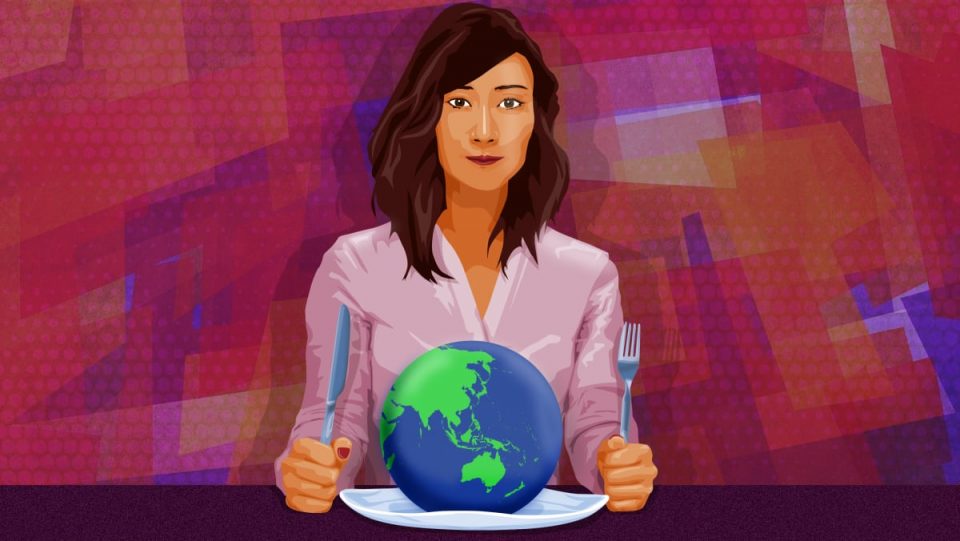“When it comes to seafood, you’re not sure if they’re beings over-fished, if they’re being farmed. I don’t want to be overtaking from the environment and not giving back,” she said.
“I think also because that all (seafood and chicken) add up carbon footprint-wise. Definitely, the resources you need to produce that is more than vegetables,” she said.
Changing food consumptionhabits would help the environment “tremendously”, Assoc Prof Carrasco said.
“For instance, if we were all vegan, food production emissions would drop by 70 per cent,” he said.
Referring to the study done by his agency with Deloitte, Dr Jonathan Low from A*Star said that having a more balanced diet and substituting 50 per cent of animal-based red meats with plant-based alternatives could reduce food greenhouse gas emissions by more than 25 per cent.
Beyond individuals’ consumption, farming needs to transform, gradually moving away from industrialised agriculture to sustainable agriculture, Prof Chen said. The key is sustainability of food production, he said, adding that changes towards an efficient agricultural system are needed.
“Promoting sustainable livestock farming, which involves sustainable feeds, higher production yield, and better manure utilisation, is a critical step forward,” he said.
Alternative food sources may become increasingly important, considering the impact of climate change on traditional farming, he added.
WHAT SOME RESTAURANTS ARE DOING
While individuals can do their part, restaurants are also taking steps to help protect the environment. Mexican-Turkish restaurant chain Stuff’d temporarily replaced its beef with a plant-based alternative in a recent collaboration with Impossible Foods, which makes such products.
The price will remain the same, said the chain’s regional business development manager Jason Tan. Stuff’d started offering Impossible beef on its menu in 2019, but price was a concern to some customers, Mr Tan said.
“Conventional beef was still the more affordable option when viewed alongside Impossible beef, creating a psychological price barrier for some who want to eat more sustainably,” he said.
Mr Tan added that the firm saw a rising consumption trend for plant-based diets and healthy food in Singapore, especially among the younger generation.
General Manager of Impossible Foods Singapore Laurent Stevenart said that the firm’s beef alternative uses 87 per cent less water, needs 96 per cent less land, contributes 89 per cent less greenhouse gas emissions, and contributes 92 per cent less freshwater pollution than conventional beef.
“We hope that this three-month collaboration campaign with Impossible Foods drives further awareness and acceptance of plant-based protein and encourages and convinces a wider audience to play their part in eating more sustainably,” Mr Tan said.
At another restaurant, Open Farm Community, many products are grown by the restaurant itself, or sourced locally, said its head chef Olvier Truesdale-Jutras.
If products are sourced overseas, the team looks out for ethical environmental practices, he said.
“Anything we can grow ourselves cuts out the whole chain of middlemen, packaging, shipping, and so on. Sourcing locally drops the emissions massively and supports the local financial ecosystem,” he said.
If it’s protein, the restaurant ensures that it is carbon-neutral from the source, Mr Truesdale-Jutras said.
“We work with three Australian farms committed to their own carbon neutrality for our non-vegetable options, and support local fish and chicken farmers as much as possible,” he said.
Carbon-neutral means that any carbon dioxide released into the atmosphere from a company’s activities is balanced by an equivalent amount being removed.
While most food and beverage operations keep food in excess to cater to the unpredictable demand for dishes from customers, his restaurant does not do this, he said.
“We would rather change the dish if we run out and use up something else from our own farm or garden than over order and sit on expensive and environmentally irresponsible amounts of product”, he said.


